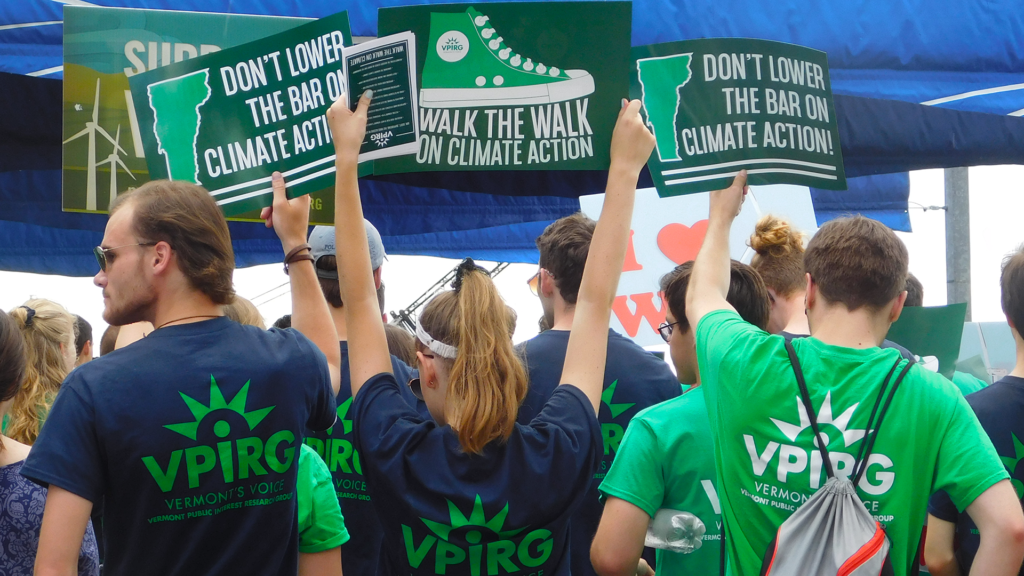The Global Warming Solutions Act will cut carbon pollution, help rebuild our economy, build healthy and resilient communities, promote the use of our natural and working lands to capture and store carbon, and adapt to our already-changing climate.
How Will it Benefit Vermonters?
As we look to rebuild from COVID-19, the Solutions Act will help accelerate our economic recovery. The bill will ensure we make smart investments in climate solutions that put people to work and strengthen local economies, reduce energy burdens for rural and marginalized communities, build community resilience, expand our commitment to a local agricultural economy, reduce the impacts and costs of future disasters, and restore and protect our natural and working lands. Reducing greenhouse pollution and investing in our resilience also has significant public health benefits ranging from saving lives, improving respiratory and cardiovascular health, reducing toxic exposures, and boosting mental health.
Why Do We Need It?
Climate change is an urgent public health challenge, and the pandemic has shown us that our communities are not prepared. Vermont is the only state in the region that has failed to reduce climate pollution below 1990 levels, and we have the highest per capita emissions in the region, including New York and Quebec. Delay is already costing Vermonters significantly and the state has no plan in place to avoid catastrophic climate damage. We have an obligation both to do our part to reduce greenhouse gas emissions and take action to support our vulnerable communities who are already feeling the impacts of the climate crisis.
What Will It Do?
Continuing to kick the can down the road on climate will just make it more expensive and devastating for Vermont families in the long run. Instead of continuing to ignore science and hoping for a miracle, the bill will ensure that Vermont takes action to put in place a strategic plan to cut climate pollution, strengthen our communities, and protect the health of Vermonters. The bill transforms our existing emission reduction goals into requirements and establishes a diverse Climate Council that will recommend climate and resilience solutions. These solutions must be equitable and ensure we do not leave rural and marginalized communities behind as we transition to a carbon free economy. Working with other state agencies, the Agency of Natural Resources will be required to identify and work collaboratively with legislators and others to advance the most strategic opportunities, putting rules and policies in place to achieve carbon reductions and build community resilience. The public will also have an important role to play in reviewing and shaping these climate solutions.
How Will It Succeed?
The health of our communities on the front lines of climate change, and the health of our children and future generations, is at stake. And Vermonters have the technology and know-how to meet this challenge. The Solutions Act provides the framework to reduce our greenhouse gas emissions to net-zero by 2050 while creating an economy and communities that are stronger, self-reliant, and more equitable.
LEGISLATION AT A GLANCE
H.688: Global Warming Solutions Act
- Gets us back on track and requires action to strengthen communities. The bill requires that we do our part to address climate change by cutting carbon emissions 80% and achieving net zero by 2050. The bill also requires action to build healthy and resilient communities.
- Ensures a just transition. Climate solutions must reduce energy burdens and minimize negative impacts on rural and marginalized communities.
- Centers science and brings the best solutions forward. The bill ensures solutions that are guided by science and grow the economy while protecting public health. It creates an open, inclusive process that gives everyone, from farmers to builders to local communities, a voice in crafting the state’s path forward.
- Uses natural systems to fight the climate crisis. The bill promotes the use of natural systems and working lands to capture and store carbon, protect against severe weather events, and build community resilience.
- Holds the State accountable. The bill sets deadlines for climate action and requires regular progress reporting. It also allows Vermonters to hold the State accountable if the climate pollution requirements are ignored.

